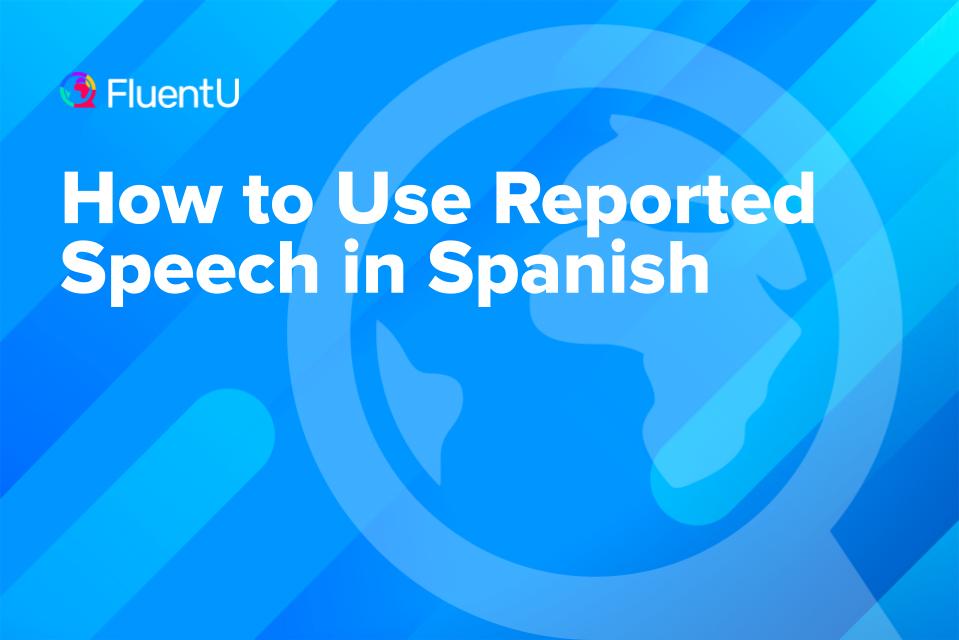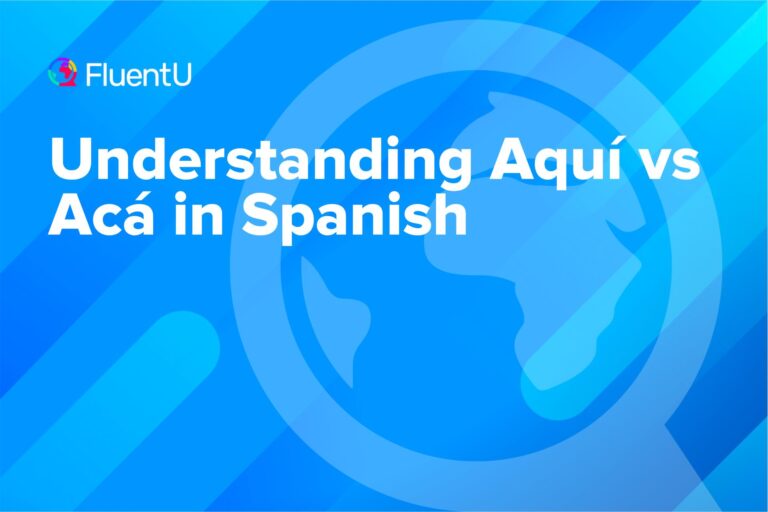How to Use Reported Speech in Spanish

Reported speech is where you talk about someone, and what that person said, without necessarily quoting them.
In English, you use it dozens (if not hundreds) of times every day without even realizing it. The good news is that you can be that natural in Spanish, too.
Download: This blog post is available as a convenient and portable PDF that you can take anywhere. Click here to get a copy. (Download)
What is Spanish Reported Speech?
Direct and reported speech are two of the most frequently-used grammar points in languages, and Spanish is no exception. Whenever you talk about what someone else has said, you use either direct or reported speech.
When you repeat exactly what another person has said and explicitly indicate who said it, you’re using direct speech. For example:
Daniel dice: “Estoy muy cansado hoy.” (Daniel says: “I am very tired today.”)
Now, let’s say you don’t remember exactly what your compadre (buddy) Daniel said, but you do remember the gist of it. If someone else asks you what Daniel said, you’d say something like:
Daniel dice que está muy cansado hoy. (Daniel says he is very tired today.)
That, in a nutshell, is reported speech. Spanish reported speech is where you talk about someone (other than yourself and the person you’re talking to) and what that person said without necessarily quoting them verbatim.
In written texts or messages, it’s usually easier to differentiate between Spanish direct and reported speech. For starters, direct speech uses quotation marks to enclose the statement being quoted, while reported speech doesn’t. Direct speech quotes the person being talked about word-for-word, while reported speech may or may not use their exact words, though the gist of what they said is always present.
So that’s it, right? Differentiating direct and reported speech in Spanish is just a matter of using the right punctuation marks and whether you used the other person’s exact words, yes?
Not quite. Although English and Spanish reported speech are similar for the most part, the latter has some unique quirks that we’ll be discussing in the next sections.
Basics of Spanish Reported Speech
Like in English, reported speech in Spanish consists of a few basic elements: reporting verbs, connecting words like que (“that”) and the message from the person being talked about—whether the message is verbatim or not.
Let’s break them down below.
Most Common Spanish Reporting Verbs
Similar to English, Spanish reporting verbs (also known as communication verbs) are used to signal that you’re either quoting someone directly (direct speech) or paraphrasing them (reported speech).
There are dozens of reporting verbs in every language, although we tend to use some of them more often than others.
Here are a few of the most common reporting verbs in Spanish:
Decir (to say, to tell)
Decir is probably the most common Spanish word to use when talking about what someone else said.
| Direct Speech | Reported Speech |
|---|---|
| Franko dice: "Quiero ir a Roma." | Franko dice que quiere ir a Roma. |
| Franko says: "I want to go to Rome." | Franko says he wants to go to Rome. |
Preguntar (to ask)
If you want to tell someone about what another person is asking, use preguntar.
| Direct Speech | Reported Speech |
|---|---|
| Franko pregunta: "¿Tienes hambre?" | Franko pregunta si tienes hambre. |
| Franko asks: "Are you hungry?" | Franko asks if you are hungry. |
Querer saber (to want to know)
Querer saber can be used in a similar way as preguntar.
| Direct Speech | Reported Speech |
|---|---|
| Franko pregunta: "¿Tienes hambre?" | Franko quiere saber si tienes hambre. |
| Franko asks: "Are you hungry?" | Franko wants to know if you are hungry. |
Pedir (to ask)
When you’re talking about what someone else wants, use pedir.
| Direct Speech | Reported Speech |
|---|---|
| Franko me pide: "¡Dámelo!" | Franko me pide que se lo dé. |
| Franko asks me: "Give it to me!" | Franko asks me to give it to him. |
Querer (to want)
Instead of pedir, you can also use querer.
| Direct Speech | Reported Speech |
|---|---|
| Franko me pide: "¡Dámelo!" | Franko quiere que se lo dé. |
| Franko asks me: "Give it to me!" | Franko wants me to give it to him. |
Other Reporting Verbs in Spanish
As I’ve mentioned earlier, there are so many Spanish reporting verbs that it would be impossible to list them all here. However, I can give you some of the most common ones:
| Spanish Reporting Verb | Example Sentence |
|---|---|
| afirmar
(assert) | Afirmó que los coches son peligrosos.
(He asserted that cars are dangerous.) |
| anunciar
(announce) | Anunció que sus resultados serían publicados a las 5:00.
(He announced that his results would be published at 5:00.) |
| añadir
(add) | Añadió que estaba muy contento.
(He added that he was very happy.) |
| asegurar
(assure) | Me aseguró que era seguro.
(He assured me that it was safe.) |
| comentar
(comment) | Comentaron que eran muy felices.
(They commented that they were very happy.) |
| confesar
(confess) | La chica confesó que estaba embarazada.
(The girl confessed that she was pregnant.) |
| contestar
(answer) | Contestó que no sabía qué hacer.
(He answered that he didn't know what to do.) |
| exclamar
(exclaim) | Ella exclamó que era muy tarde.
(She exclaimed that it was too late.) |
| prometer
(promise) | Me prometió que no mentiría nunca más.
(He promised me that he would never lie ever again.) |
| quejarse
(complain) | El niño se quejó de que no tenía juguetes.
(The boy complained that he did not have any toys.) |
| recordar
(remind) | Me recordó que era su cumpleaños.
(He reminded me that it was his birthday.) |
Using Que (That)
You may have noticed that almost all of our examples above have the word que. I’m telling you now: que is going to be your new best friend, because every single reported statement and command in Spanish will include it, even if you omit or don’t need “that” in English.
Let’s look at a few examples:
| Que in Action | English Translation |
|---|---|
| Antonio dice que le gusta cantar. | Antonio says [that] he likes singing. |
| Mi hermano ha dicho que quiere sopa. | My brother has said [that] he wants some soup. |
| Bruno me ha pedido que le ayude. | Bruno has asked me to help him. |
| Mi vecino exige que me calle. | My neighbor demands [that] I shut up. |
Spanish Reported Speech Word Order: Subject + Verb + Object
It doesn’t matter if you’re talking about a statement, command or question. The word order will always be Subject + Verb + Object, as is typical of Spanish sentence structure.
| Type of Reported Speech | Subject | Verb | Object | Full Sentence |
|---|---|---|---|---|
| Statement | Ellos dijeron que ellos
(They said that they) | tenían
(were/had) | prisa
(hurry) | Ellos dijeron que ellos tenían prisa.
(They said that they were in a hurry.) |
| Command | Mi amigo quiere que yo
(My friend wants me to) | venda
(sell) | mi coche
(my car) | Mi amigo quiere que yo venda mi coche.
(My friend wants me to sell my car.) |
| Question | Ella pregunta si tú
(She asks if you) | necesitas
(need) | algo
(something) | Ella pregunta si tú necesitas algo.
(She is asking if you need something.) |
Spanish Reported Speech Based on Questions
When the reported speech Spanish speakers use is based on questions, it deviates slightly from the structure we just discussed and is based on whether you’re using a “yes or no” question or a “wh-” question.
Yes or No Questions
In reported speech that’s based on this kind of question, you use si (if, whether) instead of que.
| Si in Action | English Translation |
|---|---|
| Loly quiere saber si el paquete ha llegado. | Loly wants to know if the package has arrived. |
| Mi hermana me ha preguntado si soy rico. | My sister has asked me if I am rich. |
“Wh-” Questions
Recall the Spanish equivalents of the English “wh-” questions:
| Spanish "Wh-" Questions | English Translation |
|---|---|
| qué | what |
| quién | who |
| cuál | which |
| cuándo | when |
| cuánto
cuánta | how much / how many |
| cómo | how |
| dónde | where |
When you’re reporting a “wh-” question, you use the appropriate question words above instead of que or si.
| Spanish Reported Speech Based on "Wh-" Questions | English Translation |
|---|---|
| Eva quiere saber qué hora es. | Eva wants to know what time it is. |
| Susana quiere saber dónde estás. | Susana wants to know where you are. |
One thing to keep in mind: when using the verb preguntar, you can add que just before the question word.
| Wh-" Questions With Que | English Translation |
|---|---|
| Eva pregunta que qué hora es. | Eva asks what time it is. |
| Susana pregunta que dónde estás. | Susana asks where you are. |
Don’t be afraid to write two que together! They aren’t the same word, and they don’t have the same function.
Other Changes in Spanish Reported Speech
Personal Pronouns and Possessives
In reported speech, the personal pronouns and possessives change from the reported version. Luckily, it works the same way in English—that is, the change is necessary so that the core message isn’t lost or misinterpreted.
| Direct Speech | Reported Speech |
|---|---|
| Ana me pidió: "Dile (tú) a mi hermano que yo no quiero ir."
(Ana asked me: "(You) tell my brother I don't want to go.") | Ana me pidió que (yo) le dijera a su hermano que ella no quería ir.
(Ana asked me to tell her brother she didn't want to go.) |
| Kuba pregunta: "¿Dónde está el libro que me dio la hermana de mi madre?"
(Kuba asks: "Where is the book my mother's sister gave me?") | Kuba pregunta que dónde está el libro que le dio la hermana de su madre.
(Kuba asks where the book his mother's sister gave him is.) |
Time and Place Expressions
Again like English, time and place expressions in the reported speech Spanish speakers use change from their direct counterparts.
Here are some of the main changes that take place:
| Time/Place Expression Changes From Direct to Reported Speech | Direct Speech | Reported Speech |
|---|---|---|
| hoy
(today) to ese día aquel día (that day) | Juan dijo: "Hoy es mi cumpleaños."
(Juan said: "Today is my birthday.") | Juan dijo que ese día era su cumpleaños.
(Juan said that day was his birthday.) |
| ahora
(now) to entonces (then) | Mi primo dijo: "Lo quiero ahora."
(My cousin said: "I want it now.") | Mi primo dijo que lo quería entonces.
(My cousin said he wanted it then.) |
| mañana
(tomorrow) to al día siguiente (the next / the following day) | Tú dijiste: "Vendré mañana."
(You said: " I will come tomorrow.") | Tú dijiste que vendrías al día siguiente.
(You said you would come the following day.) |
| ayer
(yesterday) to el día anterior (the previous day / the day before) | Carmen dijo: "Lo encontré ayer."
(Carmen said: "I found it yesterday.") | Carmen dijo que lo había encontrado el día anterior.
(Carmen said she had found it the day before.) |
| la semana que viene
(next week) el mes que viene (next month) el año que viene (next year) to a la semana siguiente (the following week) al mes siguiente (the following month) al año siguiente (the following year) | Pedro dijo: "Llegaré la semana que viene."
(Pedro said: "I will arrive next week.") | Pedro dijo que llegaría a la semana siguiente.
(Pedro said he would arrive the following week.) |
| la semana pasado
(last week) el mes pasado (last month) el año pasado (last year) to la semana anterior (the previous week) el mes anterior (the previous month) el año anterior (the previous year) | José dijo: "Me casé la semana pasada."
(José said: "I got married last week.") | José dijo que se había casado la semana anterior.
(José said he had gotten married the previous week.) |
| hace
+ period of time (period of time + ago) to hacía + period of time or period of time + antes (period of time + before) | Loly dijo: "La tienda cerró hace 5 minutos."
(Loly said: "The shop closed 5 minutes ago.") | Loly dijo que la tienda había cerrado hacía 5 minutos.
Loly dijo que la tienda había cerrado 5 minutos antes. (Loly said the shop had closed 5 minutes before.) |
| aquí
(here) to ahí allí (there) | Papá dijo: "Yo trabajo aquí."
(Dad said: "I work here.") | Papá dijo que él trabajaba allí.
(Dad said he worked there.) |
There’s a group of words I’d like to include in this section. They’re neither time nor place expressions, but they imply distance from the speaker.
| Spanish Words That Imply Distance | Direct Speech | Reported Speech |
|---|---|---|
| este
esta (this) to ese esa or aquel aquella (that) | Matt dijo: "Me gusta este libro."
(Matt said: "I like this book.") | Matt dijo que le gustaba aquel libro.
(Matt said he liked that book.) |
| estos
estas (these) to esos esas or aquellos aquellas (those) | Mamá dijo: "Quiero estos pantalones."
(Mum said: "I want these trousers.") | Mamá dijo que quería esos pantalones.
(Mum said she wanted those trousers.) |
Verb Tenses
Undoubtedly, the most troublesome part of reported speech in Spanish is that the verbs change their tenses.
The good news is that these changes don’t happen all the time, and you have almost identical changes in English.
But when do we need to make changes in verb tenses? How do we know?
The only thing you have to bear in mind here is the reporting verb. Yes, that little friend present at the beginning of the reported sentences we studied before.
There are only two straightforward rules, really:
1. If the reporting verb is in the present simple or the present perfect tense, you DON’T have to change any verb tenses unless you have a command.
2. If the reporting verb is in the preterite, the imperfect or the past perfect tense (pluscuamperfecto), you DO need to make changes.
Have a look at the following examples. The reporting verbs (in bold) are in the present simple or the present perfect, so there are no verb changes in the reported sentences.
| Verb Tense | Direct Speech | Reported Speech |
|---|---|---|
| Present Simple | Franko dice: "Tengo hambre."
(Franko says: "I am hungry.") | Franko dice que tiene hambre.
(Franko says he is hungry.) |
| Future Simple | Franko ha dicho: "Iré a España."
(Franko has said: "I will go to Spain.") | Franko ha dicho que irá a España.
(Franko has said he will go to Spain.) |
| Imperfect | Franko pregunta: "¿Qué hora era?"
(Franko asks: "What time was it?") | Franko pregunta que qué hora era.
(Franko asks what time it was.) |
As stated before, when you have a command, you do need to make changes even when the reporting verb is in the present or the present perfect tense. Therefore, the imperative changes into the present subjunctive.
| Direct Speech | Reported Speech |
|---|---|
| Franko me pide: "Dame agua."
(Franko asks me: "Give me water.") | Franko me pide que le dé agua.
(Franko asks me to give him water.) |
| Franko ha dicho: "Ten cuidado."
(Franko has said: "Be careful.") | Franko ha dicho que tenga cuidado.
(Franko has said I should be careful.) |
Similarly, if the command’s reporting verb is in the past tense, the imperative changes into the imperfect subjunctive.
| Direct Speech | Reported Speech |
|---|---|
| Franko me dijo: "Bebe agua."
(Franko told me: "Drink water.") | Franko me dijo que bebiera agua.
(Franko told me to drink water.) |
| Franko le dijo: "Vuelve a casa."
(Franko told her: "Come back home.") | Franko le dijo que volviera a casa.
(Franko told her to come back home.) |
In those sentences where the reporting verb appears in the past tense, you need to make verb tense changes in the reported fragment. These changes are almost identical to those in English, but here are the most important ones for your convenience:
| Verb Tense Change | Direct Speech | Reported Speech |
|---|---|---|
| Present Simple to Imperfect | Franko dijo: "No puedo dormir."
(Franko said: "I can't sleep.") | Franko dijo que no podía dormir.
(Franko said he couldn't sleep.) |
| Preterite to Pluscuamperfecto | Franko dijo: "Ayer compré una bici."
(Franko said: "I bought a bike yesterday.") | Franko dijo que había comprado una bici el día anterior.
(Franko said he had bought a bike the day before.) |
| Future Simple (will) to Conditional Simple (would) | Franko dijo: "Llegaré tarde."
(Franko said: "I will arrive late.") | Franko dijo que llegaría tarde.
(Franko said he would arrive late.) |
In those sentences where the verb is in the imperfect, conditional or past perfect ( pluscuamperfecto ), there are no tense changes.
| Verb Tense | Direct Speech | Reported Speech |
|---|---|---|
| Imperfect | Franko dijo: "La casa era muy bonita."
(Franko said: "The house was very beautiful.") | Franko dijo que la casa era muy bonita.
(Franko said the house was very beautiful.) |
| Conditional | Franko dijo: "Me gustaría comer pizza."
(Franko said: "I would like to eat pizza.") | Franko dijo que le gustaría comer pizza.
(Franko said he would like to eat pizza.) |
| Pluscuamperfecto | Franko dijo: "A las 3 ella ya había llegado."
(Franko said: "She had already arrived at 3.") | Franko dijo que a las 3 ella ya había llegado.
(Franko said she had already arrived at 3.) |
I know this can all sound very overwhelming and confusing, so I’d like to introduce you to the language learning platform FluentU, where you can watch reported speech in Spanish in action.
FluentU takes authentic videos—like music videos, movie trailers, news and inspiring talks—and turns them into personalized language learning lessons.
You can try FluentU for free for 2 weeks. Check out the website or download the iOS app or Android app.
P.S. If you decide to sign up now, you can take advantage of our current sale!

And that’s all!
As you can see, Spanish and English reported speeches are very similar.
Just remember the few rules I’ve taught you in this post, and you’ll have no problem at all!
Download: This blog post is available as a convenient and portable PDF that you can take anywhere. Click here to get a copy. (Download)
And One More Thing…
If you've made it this far that means you probably enjoy learning Spanish with engaging material and will then love FluentU.
Other sites use scripted content. FluentU uses a natural approach that helps you ease into the Spanish language and culture over time. You’ll learn Spanish as it’s actually spoken by real people.
FluentU has a wide variety of videos, as you can see here:

FluentU brings native videos within reach with interactive transcripts. You can tap on any word to look it up instantly. Every definition has examples that have been written to help you understand how the word is used. If you see an interesting word you don’t know, you can add it to a vocab list.

Review a complete interactive transcript under the Dialogue tab, and find words and phrases listed under Vocab.

Learn all the vocabulary in any video with FluentU’s robust learning engine. Swipe left or right to see more examples of the word you’re on.

The best part is that FluentU keeps track of the vocabulary that you’re learning, and gives you extra practice with difficult words. It'll even remind you when it’s time to review what you’ve learned. Every learner has a truly personalized experience, even if they’re learning with the same video.
Start using the FluentU website on your computer or tablet or, better yet, download the FluentU app from the iTunes or Google Play store. Click here to take advantage of our current sale! (Expires at the end of this month.)







